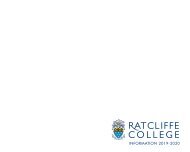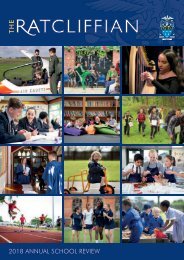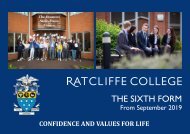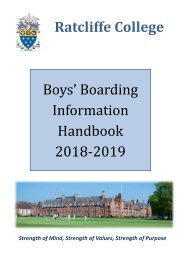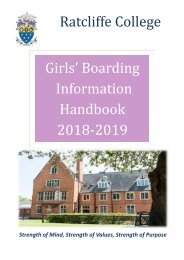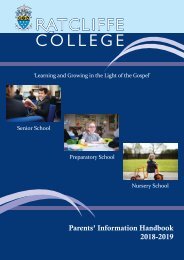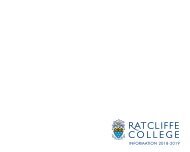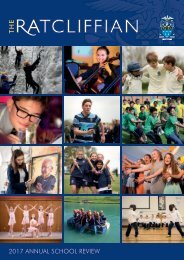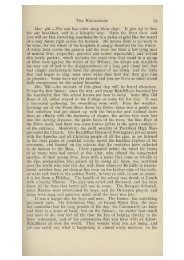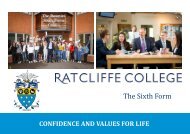Ratcliffe-College-Key-Stage-3-Handbook-2016-2017
You also want an ePaper? Increase the reach of your titles
YUMPU automatically turns print PDFs into web optimized ePapers that Google loves.
English<br />
What you will study:<br />
Throughout <strong>Key</strong> <strong>Stage</strong> Three, you will explore a range of writing styles and<br />
genres through the study of novels, plays, poetry and media and non-fiction<br />
texts. You will then be required to complete a variety of writing tasks. These<br />
will take the form of creative writing, analytical essays, poetry and transactional<br />
writing. The ability to use Standard English in a variety of contexts is a crucial<br />
objective and is essential to your progress in this key stage. Grammar and<br />
spelling are, of course, important and you will build upon these skills each year.<br />
By the end of <strong>Key</strong> <strong>Stage</strong> Three you will have gained confidence in your writing<br />
and be able to write for a wide range of purposes and audiences.<br />
Reading a wide variety of literature is a fundamental and enjoyable requirement<br />
at <strong>Key</strong> <strong>Stage</strong>Three. You will be expected to keep an accurate reading record<br />
which will be regularly checked by your classroom teacher. You will also be<br />
encouraged to develop the breadth of your own personal reading using the school<br />
library as well as books from home and local libraries. Personal reading is<br />
essential to the development of your spoken and written English and will<br />
significantly contribute to your ability to write in a variety of different styles.<br />
Furthermore, you will study a wide range of texts in class and complete a<br />
number of tasks based on your understanding of various themes, characters,<br />
setting and language features.<br />
Finally, spoken language tasks are important to help you develop confidence in<br />
your presentation and oratory skills. Public speaking competitions, group<br />
debating, discussions and presentations will feature in every year, and you will be<br />
formally assessed on these skills by your teacher. Various dramatic techniques<br />
will be used to develop your understanding throughout the year, especially during<br />
the study of Shakespeare texts.<br />
In Year 7, your study of English will be separated into three different areas. At<br />
the beginning of the autumn term, you will study a range of autobiographical<br />
texts as well as nineteenth-century fiction. Creative writing is also a feature of<br />
this term. Your lessons will regularly include tasks on spelling and grammar. The<br />
spring term will be dedicated to the study of poetry and finally the summer<br />
term will be focused around preparation for the end of year examination and<br />
persuasive writing.<br />
You will start the autumn term of Year 8 by exploring non-fiction texts and<br />
transactional writing. The spring term will be dedicated to the study of<br />
Shakespeare’s play Romeo and Juliet, where you will be expected to use practical<br />
drama techniques to explore the text. The summer term will involve preparation<br />
77





